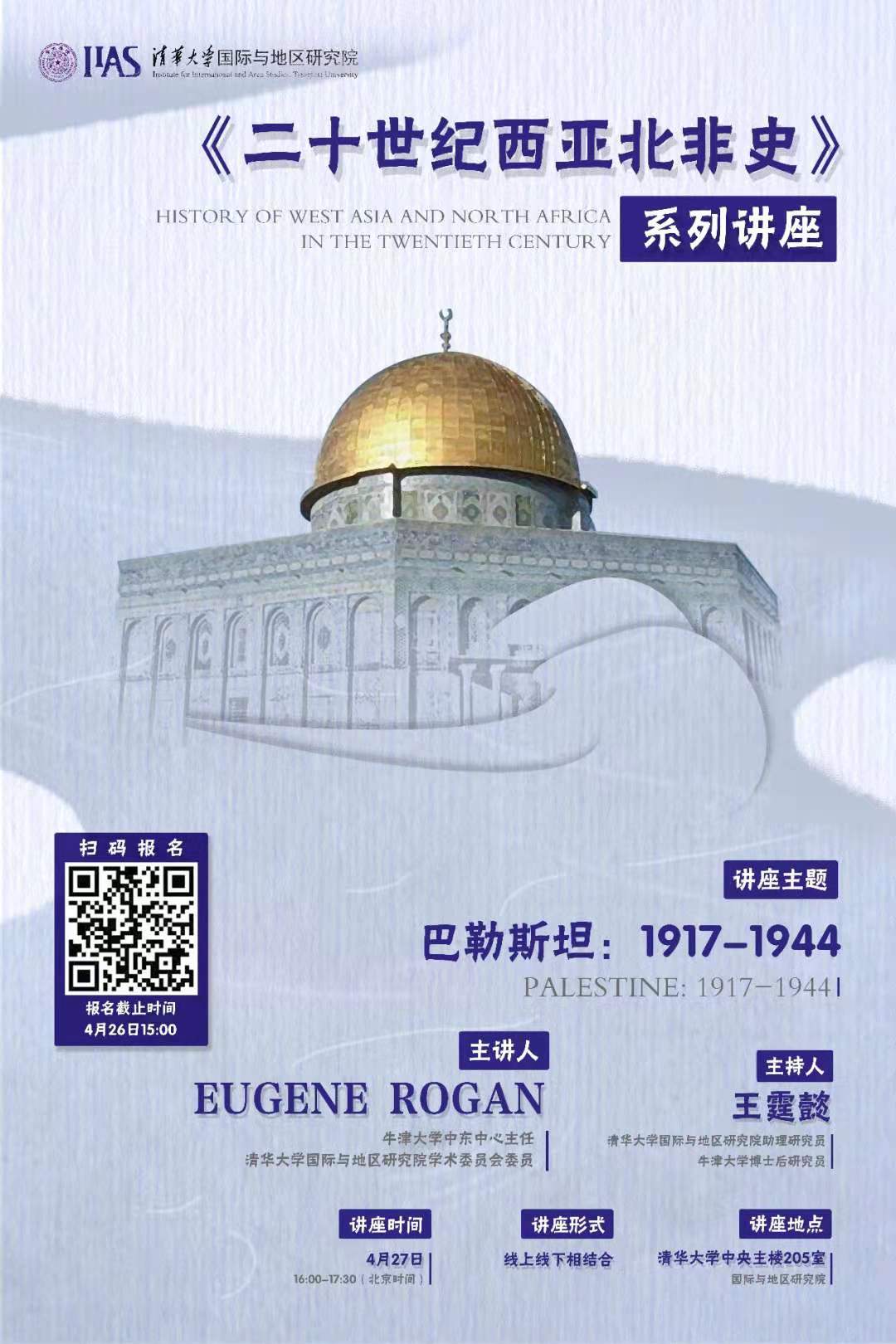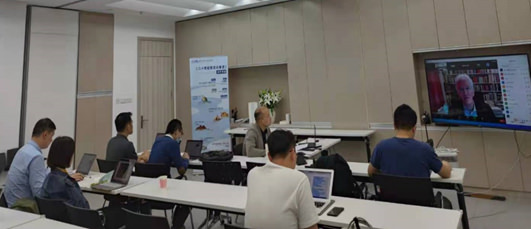
The 4th Chapter of “History of West Asia and North Africa in the Twentieth Century” Lecture Series | Palestine: 1917-1944

On the afternoon of April 27th, 2021, Prof. Eugene Rogan, Member of the Academic Committee of Institute for International and Area Studies, Tsinghua University (IIAS-THU), and Professor of Middle East History at the University of Oxford, gave an online lecture on the theme of “Palestine: 1917-1944” to the audience, including students from IIAS and other leading academic institutions home and abroad. This lecture is the fourth chapter in a series of lectures on “History of West Asia and North Africa in the Twentieth Century” and was hosted by Wang Tingyi, Assistant Professor at IIAS.
This lecture reviewed the internal and external situations of Palestine and the changes of British colonial policy in Palestine in the interwar years. At the beginning of the lecture, Prof. Rogan highlighted that the British mandate in Palestine had failed from the beginning. Britain failed to fulfill its obligation in the League of Nations, which is, to help to achieve the Palestinian autonomy. On the contrary, Britain exerted direct colonial rule in Palestine, and the local high-ranking political officials were all British high commissioners. Moreover, the long-term turbulence in Palestine was the result of British colonial rule, and the Balfour Declaration led to the flocking of a large number of Jews into Palestine, which became the root of the long-standing conflicts among two ethnic groups. At the beginning of World War I, Britain did not intend to bring Palestine into its imperial sphere of influence. However, due to the changes in the war, Britain included Palestine into its imperial territory and began to colonize it in 1917 in order to maintain its absolute control over Suez Canal and Egypt.
Prof. Rogan stressed that the essence of the Balfour Declaration is that Britain intended to use Zionism to ensure its rule over Palestine. The usage of words in the Declaration was mostly religious instead of political, with the aim of avoiding triggering the thoughts of political independence among Palestinian Arabs or Jews so that British colonial rule over Palestine would be safeguarded. From 1919 to 1921, the influx of European Jews aggravated the tension in Palestine and resulted in many riots. In 1922, Winston Churchill, then British Secretary of State for Colonial Affairs, issued a policy statement, namely Churchill White Paper. The White Paper not only was self-contradictory, but also deepened the confrontation among Palestinians, Zionists and the British, which was further intensified in the 1920s and 1930s.
Prof. Rogan then introduced the state of division and struggle within the Palestinian leadership. Because there was no common policy, such division weakened their influence in negotiations with Britain. The partition plan of the Peel Committee in 1937 was the first time that the British realized that the Palestinian issue was not an issue between incompatible religious groups, but an issue between competing and incompatible nationalism and Jewish Zionists and Palestinian Arabs. The solution proposed by this partition plan was not to end Britain’s colonial rule over Palestine, but to regard the Jewish community in Palestine as an alliance to assist Britain in ruling Palestine, so that Britain would have stronger ruling power over Palestine.
After the lecture, Prof. Rogan had heated discussions with the audience and gave insightful answers to a number of questions raised by the audience, including Egypt’s role in the Palestinian Arab uprising, the definition of Jewish ethnic group (religious or political), and the rise and development of Israel as a modern state.

Professor Eugene Rogan
BA Columbia, MA PhD Harvard, MA Oxford
Professor of Modern Middle Eastern History
Director, St Antony’s College Middle East Centre
Eugene Rogan is Director of the Middle East Centre at St Antony’s College, University of Oxford. He has a B.A. in economics from Columbia, and an M.A. and PhD in Middle Eastern history from Harvard. He taught at Boston College and Sarah Lawrence College before taking up his post in Oxford in 1991, where he teaches the modern history of the Middle East to both undergraduates and graduates as well as providing DPhil supervision. He was elected a Fellow of the British Academy in 2017.
He is author of The Arabs: A History (Penguin, 2009, 3rd edition 2018), which has been translated in 18 languages and was named one of the best books of 2009 by The Economist, The Financial Times, and The Atlantic Monthly. His earlier works include Frontiers of the State in the Late Ottoman Empire (Cambridge University Press, 1999), for which he received the Albert Hourani Book Award of the Middle East Studies Association of North America and the Fuad Köprülü Prize of the Turkish Studies Association; The War for Palestine: Rewriting the History of 1948 (Cambridge University Press, 2001, second edition 2007, with Avi Shlaim), which has been published in Arabic, French, Turkish and Italian editions; and Outside In: On the Margins of the Modern Middle East (I.B. Tauris, 2002).
His new book, The Fall of the Ottomans: The Great War in the Middle East, 1914-1920, was published in February 2015.
Text by: Wang Zijing
Typesetting by: Wang Zijing
Reviewed by: Wang Tingyi & Zhang Yuan
Related Content
- Russian Economy and Eurasian Economy Lecture Series: Lecture 5 | Russia’s Economic Growth Model and Resource Dependence
- Russian Economy and Eurasian Economy Lecture Series: Lecture 4 | Russia’s Economic Strength and Social Development
- Russian Economy and Eurasian Economy Lecture Series: Lecture 3 | Russia’s Economic Transformation and Building of Modern Market Economy
- Russian Economy and Eurasian Economy Lecture Series: Lecture 2 | The Relevance of Historical and Cultural Factors to World Economic Analysis: A Case Study on the Economy of Russia and Ukraine Before and After the Conflict

